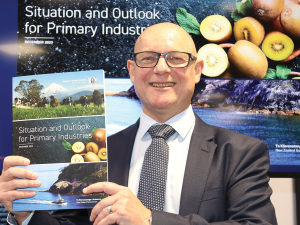NZ Catchment Groups Thrive with ‘Source to Sea’ Approach
The most successful catchment groups in NZ are those that have 'a source to sea' approach.
 Ray Smith says red meat producers are being hit with a double whammy of increasing farm input costs and a declining demand for product.
Ray Smith says red meat producers are being hit with a double whammy of increasing farm input costs and a declining demand for product.
It's a real challenge for the country's red meat sector.
That's the word from the Director General of MPI, Ray Smith, speaking at the launch of that organisation's latest Situation and Outlook for Primary Industries (SOPI), late last year.
The Ministry for Primary Industries' report forecasts an ongoing fall in the value of lamb exports over the next two years, while beef and veal prics are forecast to drop in 2024 but pick up slightly in 2025. Overall export revenue from the meat and wool sector is forecast to decrease by 5% to $11.6 billion in the year to June 30 2024.
However, according to the SOPI report, this will be partly offset by an increase in revenue from venison and pet food.
The report adds that both farm and processor profitability are forecast to fall in 2023/24 due to lower prices and increased farm costs.
Smith told Rural News that farmers are being hit with a double whammy of increasing farm input costs and, at the same time, a declining demand for product.
"A lot will depend on when China comes back into the market as a lot of our products goes there; it is a very important markets for us," he explains. "China has been in slowdown since they came out of Covid, resulting in weak consumer demand and a bit of a lack of confidence in the market."
Smith was in China recently and met with a lot of people. He says there is a sense that if you look out 12 to 24 months ahead, we will start to see that confidence come back into that market.
China takes 38% of all NZ's meat and wool products. Breaking this figure down, 34% of our lamb goes to that market, 77% of our mutton, 43% of beef and veal and 39% of NZ's wool.
Commentary in the SOPI report says, globally, middle- and lower-income earners are expected to trade down from lamb and prime beef products to lower priced proteins - such as chicken and ground beef.
There is a bit of good news for NZ meat with higher demand in the US for manufacturing beef, used mainly in hamburgers. This trend is likely, according to the SOPI report, to limit some of the damage caused by lower prime beef prices.
Smith believes the situation in China has to some degree spilled over into other parts of Southeast Asia, but overall, the whole global economy has flattened out. On the positive side, he says there is still product getting into Europe and the US and NZ's red meat sector has a range of countries it can export to.
"But it's just in a really difficult squeeze at the moment," he says.
The other factor affecting NZ lamb exports is Australia dumping large quantities of lamb on the global market, which in turn has forced prices down. On the home front, MPI's SOPI report is predicting a high lamb crop in 2023/24 due to favourable conditions during mating and a mild winter that has led to overall higher lambing percentages.
However, there is a warning that the forecast warmer El Nino weather pattern may reduce late-season slaughter weights and there ay also be more lambs going for processing, due to dry weather and lower feed availability. The impact of this at the farmgate may drive down schedule prices.
The news on the wool front is bleak with prices forecast to soften by a further 2% in the coming year.
Our Pet Export
Apart from horticulture, one of the stars of the SOPI report was the growth of our pet meat exports. Most of NZ expors are aimed at high-end consumers and it seems these people want the best for their pets as well as themselves.
In the year to June 2023, NZ's pet food exports rose by 13%, which came on top of a 17% increase in the previous year.
The SOPI report notes that this trend is due to 'the humanisation of pets'.
The other sector to show positive growth is venison, with export prices forecast to increase 3% to $14.70 per kg in 2023/24. Again, it's the elite nature of the product that is attracting consumers in the US and China.
Former Fonterra executive Alex Turnbull has been appointed CEO to lead all five Yili Oceania Business Division companies in New Zealand.
Fonterra executive René Dedoncker is leaving the co-operative later this year to lead Australian agribusiness Elders.
Alliance Group and the Southland Stags rugby team have joined forces in a partnership that will see the the meat co-operative's farmgate brand feature on players' team kits and replica jerseys.
Fonterra's plan to expand its organic programme to the South Island is being well received by farmers, the co-op says.
Voting has started for the renewal of DairyNZ's milksolids levy.
The most successful catchment groups in NZ are those that have 'a source to sea' approach.